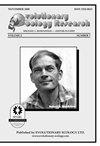温度和食物胁迫对黄粪蝇能量储备和饥饿抗性的影响
Q2 Agricultural and Biological Sciences
引用次数: 43
摘要
相互竞争的假说:(1)体型越大,能量利用效率越高(相对效率假说)。(2)体型大需要更多的能量来维持,在食物有限的情况下(绝对能量需求假说)是一个劣势。生物:黄粪蝇,粪蝇科(双翅目:粪蝇科),根据体型大小在实验室人工选择了11(24)代。方法:在有限和无限幼虫摄食条件下,低温和高温胁迫下饲养蝇类,成虫羽化后仅在水中饲养,在实验室研究完全饥饿(饥饿抗性)条件下能量含量(脂、葡萄糖、糖原)与成虫(生理)寿命的关系。结论:限食和高温降低了幼虫的寿命。体型越大,寿命越长,因为体型越大的果蝇能量含量越高。小选择系果蝇在完全饥饿条件下具有相对较多的能量和较长的寿命,表明体型选择具有代偿性相关的遗传反应。体型较大的雄性在多重压力下受到的影响最大。我们的研究结果支持了相对效率假说,它可以弥补体型较大的个体的绝对能量需求。本文章由计算机程序翻译,如有差异,请以英文原文为准。
Size-dependent effects of temperature and food stress on energy reserves and starvation resistance in yellow dung flies
Competing hypotheses: (1) Large body size confers more efficient energy use (relative efficiency hypothesis). (2) Large body size requires more energy to be sustained, a disadvantage when food is limited (absolute energy demand hypothesis). Organism: Yellow dung flies, Scathophaga stercoraria (Diptera: Scathophagidae), artificially selected for large and small body size in the laboratory for 11 (24) generations. Methods: Flies were reared in limited and unlimited larval food conditions and low and stressfully high temperatures, and after adult emergence they were held on water only to study the relationship between energy content (lipids, glucose, glycogen) and (physiological) adult life span under complete starvation (starvation resistance) in the laboratory. Conclusions: Limited larval food and high temperature decreased life span. Life span increased markedly with body size due to the greater energy content of larger flies. Small selection line flies had relatively more energy and longer life spans under complete starvation, indicating a compensatory correlated genetic response to body size selection. The larger males suffered most under multiple stresses. Our results support the relative efficiency hypothesis, which more than compensates for the greater absolute energy demand of larger individuals.
求助全文
通过发布文献求助,成功后即可免费获取论文全文。
去求助
来源期刊

Evolutionary Ecology Research
生物-进化生物学
自引率
0.00%
发文量
0
审稿时长
>12 weeks
期刊介绍:
Evolutionary Ecology Research publishes original research contributions focusing on the overlap between ecology
and evolution. Papers may treat any taxon or be general. They may be empirical, theoretical or a combination of the two.
EER prefers conceptual contributions that take intellectual risks or that test ideas.
 求助内容:
求助内容: 应助结果提醒方式:
应助结果提醒方式:


